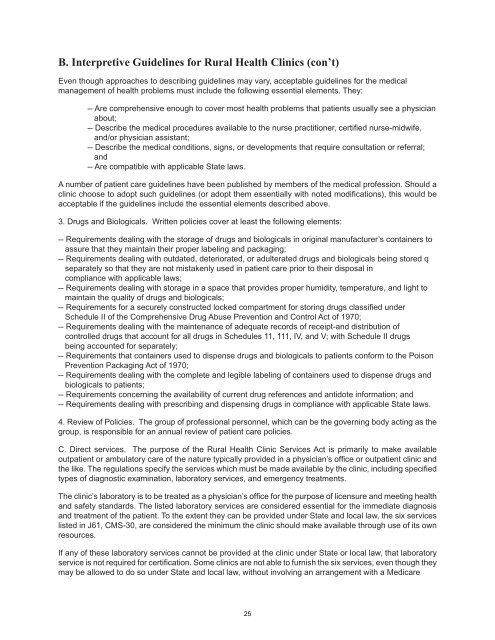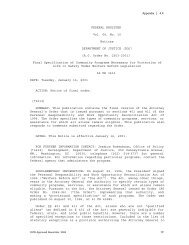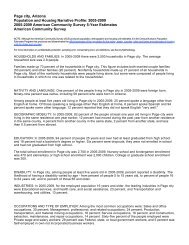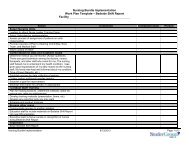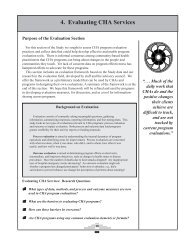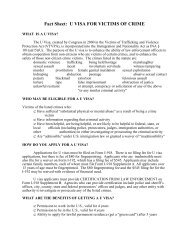Arizona Rural Health Clinic Designation Manual - Arizona Center for ...
Arizona Rural Health Clinic Designation Manual - Arizona Center for ...
Arizona Rural Health Clinic Designation Manual - Arizona Center for ...
Create successful ePaper yourself
Turn your PDF publications into a flip-book with our unique Google optimized e-Paper software.
B. Interpretive Guidelines <strong>for</strong> <strong>Rural</strong> <strong>Health</strong> <strong>Clinic</strong>s (con’t)<br />
Even though approaches to describing guidelines may vary, acceptable guidelines <strong>for</strong> the medical<br />
management of health problems must include the following essential elements. They:<br />
-- Are comprehensive enough to cover most health problems that patients usually see a physician<br />
about;<br />
-- Describe the medical procedures available to the nurse practitioner, certifi ed nurse-midwife,<br />
and/or physician assistant;<br />
-- Describe the medical conditions, signs, or developments that require consultation or referral;<br />
and<br />
-- Are compatible with applicable State laws.<br />
A number of patient care guidelines have been published by members of the medical profession. Should a<br />
clinic choose to adopt such guidelines (or adopt them essentially with noted modifi cations), this would be<br />
acceptable if the guidelines include the essential elements described above.<br />
3. Drugs and Biologicals. Written policies cover at least the following elements:<br />
-- Requirements dealing with the storage of drugs and biologicals in original manufacturer’s containers to<br />
assure that they maintain their proper labeling and packaging;<br />
-- Requirements dealing with outdated, deteriorated, or adulterated drugs and biologicals being stored q<br />
separately so that they are not mistakenly used in patient care prior to their disposal in<br />
compliance with applicable laws;<br />
-- Requirements dealing with storage in a space that provides proper humidity, temperature, and light to<br />
maintain the quality of drugs and biologicals;<br />
-- Requirements <strong>for</strong> a securely constructed locked compartment <strong>for</strong> storing drugs classifi ed under<br />
Schedule II of the Comprehensive Drug Abuse Prevention and Control Act of 1970;<br />
-- Requirements dealing with the maintenance of adequate records of receipt-and distribution of<br />
controlled drugs that account <strong>for</strong> all drugs in Schedules 11, 111, IV, and V; with Schedule II drugs<br />
being accounted <strong>for</strong> separately;<br />
-- Requirements that containers used to dispense drugs and biologicals to patients con<strong>for</strong>m to the Poison<br />
Prevention Packaging Act of 1970;<br />
-- Requirements dealing with the complete and legible labeling of containers used to dispense drugs and<br />
biologicals to patients;<br />
-- Requirements concerning the availability of current drug references and antidote in<strong>for</strong>mation; and<br />
-- Requirements dealing with prescribing and dispensing drugs in compliance with applicable State laws.<br />
4. Review of Policies. The group of professional personnel, which can be the governing body acting as the<br />
group, is responsible <strong>for</strong> an annual review of patient care policies.<br />
C. Direct services. The purpose of the <strong>Rural</strong> <strong>Health</strong> <strong>Clinic</strong> Services Act is primarily to make available<br />
outpatient or ambulatory care of the nature typically provided in a physician’s offi ce or outpatient clinic and<br />
the like. The regulations specify the services which must be made available by the clinic, including specifi ed<br />
types of diagnostic examination, laboratory services, and emergency treatments.<br />
The clinic’s laboratory is to be treated as a physician’s offi ce <strong>for</strong> the purpose of licensure and meeting health<br />
and safety standards. The listed laboratory services are considered essential <strong>for</strong> the immediate diagnosis<br />
and treatment of the patient. To the extent they can be provided under State and local law, the six services<br />
listed in J61, CMS-30, are considered the minimum the clinic should make available through use of its own<br />
resources.<br />
If any of these laboratory services cannot be provided at the clinic under State or local law, that laboratory<br />
service is not required <strong>for</strong> certifi cation. Some clinics are not able to furnish the six services, even though they<br />
may be allowed to do so under State and local law, without involving an arrangement with a Medicare<br />
25


